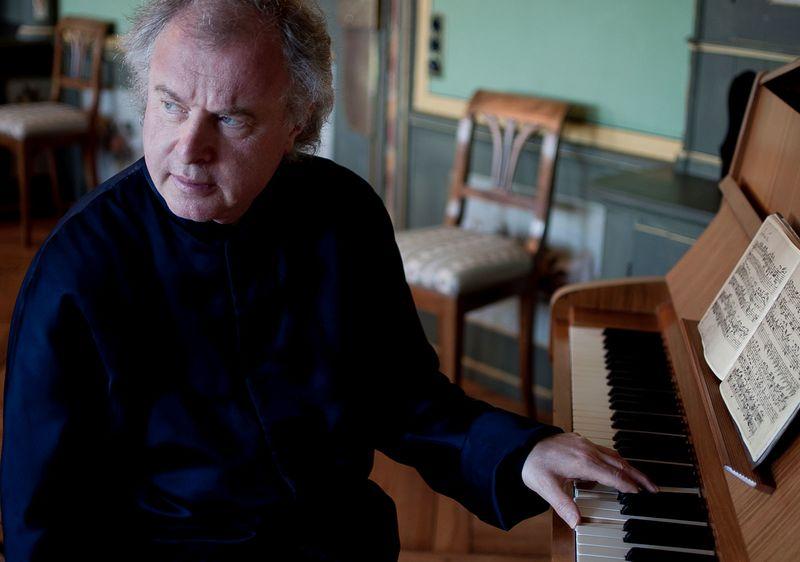Schiff, Orchestra of the Age of Enlightenment, RFH review – antique kit, modern sounds | reviews, news & interviews
Schiff, Orchestra of the Age of Enlightenment, RFH review – antique kit, modern sounds
Schiff, Orchestra of the Age of Enlightenment, RFH review – antique kit, modern sounds
Instrumental time-travels rejuvenate a Romantic trio

Standing next to the warm brown beast of a piano built by Blüthner in Leipzig in 1867, Sir András Schiff advised his audience last night to clear their minds and ears of preconceptions.
However, this “historically informed” evening of Schumann and Brahms with Schiff (as both soloist and conductor) and the Orchestra of the Age of Enlightenment did much more than cleanse our musical palettes of the cloying tastes once associated with over-upholstered Brahms from heavyweight bands. In the hands of Schiff and the super-fit OAE, a trio of Romantic experiments recovered the prickle of risk, shock and uncertainty that accompanied their birth and first public outings.
That high-wire, edge-of-seat excitement began with the opener: Schumann’s extraordinary Konzertstück in F major for four horns and orchestra. Written in 1849 just as the newish valve horn was supplanting its more rustic natural ancestor in the concert hall, the piece exploits all the chromatic nuance and variation enabled by this outlandish modern kit. Effectively, the horns become a quartet with accompaniment; sometimes a consenting chorus of voices, often a wittily quarrelling gang of rivals. As the OAE’s rich-toned and virtuosic principal Roger Montgomery led the pack, the four brassy musketeers – with Martin Lawrence, Gavin Edwards and David Bentley the other swashbucklers – gamely tackled four demanding showpiece parts that test-drive this new technology.
Their reconstructed instruments sometimes felt an (understandable) sense of strain in lines that shoot up the very top of the horn range, but the frisson of danger only added to the thrill. Dazzling ensemble work saw dotted phrases passed from hand to hand with head-spinning velocity, while the faraway melancholy of the work’s middle section hinted (not for the only time last night) at Wagnerian forest murmurs. Demonic passagework marked the super-brisk finale, with Montgomery once more first among equals. The four amigos forged a sound that, if its lacked the secure and grounded sheen of a more traditional star turn for the horns, overflowed with spontaneity, zest and fun.
That mood carried over into Schiff’s interpretation of Schumann’s fourth symphony: not the now-popular 1841 original that his friend and heir Brahms insisted on publishing, but the more closely-wrought 1851 revision. Stickless and scoreless, Schiff shaped the first movement with gentle but irresistible authority. He managed the tricky shift from the honeyed smoothness of the slow opening to the driving, dancing energy of the main section with utter aplomb. The rolling thunder of the timpani alarmed and excited us; the OAE trombones and trumpets proved a match for those muscular yet agile horns; entrances and exits cut like a well-honed blade. In the lovely song-like Romanze, stand-out contributions from cello and oboe (Luise Buchberger and Daniel Bates) paved the way for ravishing solo wanderings on the violin from leader Kati Debretzeni.
The OAE throughout sounded trim, poised and alert, gathering momentum in the frenetic scherzo until it slowed to a halt. Another masterful Schiff transition saw a spine-tingling segue into the finale, with the horns again imbued with an almost Wagnerian (or at least Weberian) grandeur and mystery. We closed, courtesy of the pacy and nimble OAE (pictured below), with the whirlwind gallop of a country bop that overlays a kind of Baroque fugue. Here, and elsewhere, Schiff and his crew let us hear the shape-shifting strangeness that flickers through this unquiet music.
 That 1867 Blüthner brought its own uncanny qualities to Schiff’s account of Brahms’s youthful concerto: a work composed in the shadow of his mentor Schumann but packed with accents of its own. Let’s be frank: some conventionally-minded Brahms lovers would have wondered why Schiff eschewed the mighty purring motors of the modern piano world for this quaint jalopy. But you can hear the First thumped out on some hulking tank of an instrument any day of the week. With the comparatively frail but deeply expressive Blüthner responding to his coaxing, cajoling touch, Schiff uncovered layers not just of period charm but spontaneity, freshness and deep originality in the score.
That 1867 Blüthner brought its own uncanny qualities to Schiff’s account of Brahms’s youthful concerto: a work composed in the shadow of his mentor Schumann but packed with accents of its own. Let’s be frank: some conventionally-minded Brahms lovers would have wondered why Schiff eschewed the mighty purring motors of the modern piano world for this quaint jalopy. But you can hear the First thumped out on some hulking tank of an instrument any day of the week. With the comparatively frail but deeply expressive Blüthner responding to his coaxing, cajoling touch, Schiff uncovered layers not just of period charm but spontaneity, freshness and deep originality in the score.
Yes, you had to adjust to the twangy bloom around each note, the oddly curtailed resonance, the hint of tinniness on top and the weird feeling of a work played by peals of ancient weathered bells. But there was beauty in abundance too. After the storm-tossed, timpani-led opening, Schiff’s meditative exploration of the first movement’s brooding main theme felt – like his performance as whole – not quaint but unaffected, probing; almost naked. The venerable warhorse became a fragile colt, sometimes unsteady on its legs. The adagio glowed with clearly-articulated wistfulness and yearning, as the delicate chime-like timbre of the piano banished any hint of foggy or soupy excess. Fans of today’s instrumental tech will have missed a plush velvet depth; yet the homespun candour Schiff drew from his plain-spoken veteran helped to strip away the varnish of familiarity.
Above all, Brahms designed this piece as a dialogue between soloist and orchestra rather than a limelight-hogging vehicle for pianistic exhibitionism. Standing (or rather shooting) up to conduct the purely orchestral passages, Schiff gave us that sense of a turbulent, evolving conversation. The strenuous to-and-fro never yielded to solo grandstanding, even as the skipping, dancing runs of the closing rondo – which avoided breakneck tempos – swung the spotlight back on the pianist’s unfussy effervescence. For some, that unsettling, time-warp Blüthner sound will have snagged their ears to the detriment of the performance. For me, it sat neatly with the focus of the programme as a whole on “period” stylings not as musty pedantry but as revelation and rejuvenation. That said, Schiff’s encore – a silken account of one of Brahms’s Op.118 intermezzos – evoked a timeless tenderness.
rating
Share this article
The future of Arts Journalism
You can stop theartsdesk.com closing!
We urgently need financing to survive. Our fundraising drive has thus far raised £49,000 but we need to reach £100,000 or we will be forced to close. Please contribute here: https://gofund.me/c3f6033d
And if you can forward this information to anyone who might assist, we’d be grateful.

Subscribe to theartsdesk.com
Thank you for continuing to read our work on theartsdesk.com. For unlimited access to every article in its entirety, including our archive of more than 15,000 pieces, we're asking for £5 per month or £40 per year. We feel it's a very good deal, and hope you do too.
To take a subscription now simply click here.
And if you're looking for that extra gift for a friend or family member, why not treat them to a theartsdesk.com gift subscription?
more Classical music
 BBC Proms: Alexander’s Feast, Irish Baroque Orchestra, Whelan review - rapturous Handel fills the space
Pure joy, with a touch of introspection, from a great ensemble and three superb soloists
BBC Proms: Alexander’s Feast, Irish Baroque Orchestra, Whelan review - rapturous Handel fills the space
Pure joy, with a touch of introspection, from a great ensemble and three superb soloists
 BBC Proms: Moore, LSO, Bancroft review - the freshness of morning wind and brass
English concert band music...and an outlier
BBC Proms: Moore, LSO, Bancroft review - the freshness of morning wind and brass
English concert band music...and an outlier
 Willis-Sørensen, Ukrainian Freedom Orchestra, Wilson, Cadogan Hall review - romantic resilience
Passion, and polish, from Kyiv's musical warriors
Willis-Sørensen, Ukrainian Freedom Orchestra, Wilson, Cadogan Hall review - romantic resilience
Passion, and polish, from Kyiv's musical warriors
 BBC Proms: The Marriage of Figaro, Glyndebourne Festival review - merriment and menace
Strong Proms transfer for a robust and affecting show
BBC Proms: The Marriage of Figaro, Glyndebourne Festival review - merriment and menace
Strong Proms transfer for a robust and affecting show
 BBC Proms: Faust, Gewandhausorchester Leipzig, Nelsons review - grace, then grandeur
A great fiddler lightens a dense orchestral palette
BBC Proms: Faust, Gewandhausorchester Leipzig, Nelsons review - grace, then grandeur
A great fiddler lightens a dense orchestral palette
 BBC Proms: Jansen, Royal Concertgebouw Orchestra, Mäkelä review - confirming a phenomenon
Second Prom of a great orchestra and chief conductor in waiting never puts a foot wrong
BBC Proms: Jansen, Royal Concertgebouw Orchestra, Mäkelä review - confirming a phenomenon
Second Prom of a great orchestra and chief conductor in waiting never puts a foot wrong
 BBC Proms: Royal Concertgebouw Orchestra, Mäkelä review - defiantly introverted Mahler 5 gives food for thought
Chief Conductor in Waiting has supple, nuanced chemistry with a great orchestra
BBC Proms: Royal Concertgebouw Orchestra, Mäkelä review - defiantly introverted Mahler 5 gives food for thought
Chief Conductor in Waiting has supple, nuanced chemistry with a great orchestra
 Dunedin Consort, Butt / D’Angelo, Muñoz, Edinburgh International Festival 2025 review - tedious Handel, directionless song recital
Ho-hum 'comic' cantata, and a song recital needing more than a beautiful voice
Dunedin Consort, Butt / D’Angelo, Muñoz, Edinburgh International Festival 2025 review - tedious Handel, directionless song recital
Ho-hum 'comic' cantata, and a song recital needing more than a beautiful voice
 Classical CDs: Dungeons, microtones and psychic distress
This year's big anniversary celebrated with a pair of boxes, plus clarinets, pianos and sacred music
Classical CDs: Dungeons, microtones and psychic distress
This year's big anniversary celebrated with a pair of boxes, plus clarinets, pianos and sacred music
 BBC Proms: Liu, Philharmonia, Rouvali review - fine-tuned Tchaikovsky epic
Sounds perfectly finessed in a colourful cornucopia
BBC Proms: Liu, Philharmonia, Rouvali review - fine-tuned Tchaikovsky epic
Sounds perfectly finessed in a colourful cornucopia
 BBC Proms: Suor Angelica, LSO, Pappano review - earthly passion, heavenly grief
A Sister to remember blesses Puccini's convent tragedy
BBC Proms: Suor Angelica, LSO, Pappano review - earthly passion, heavenly grief
A Sister to remember blesses Puccini's convent tragedy
 BBC Proms: A Mass of Life, BBCSO, Elder review - a subtle guide to Delius's Nietzschean masterpiece
Mark Elder held back from blasting the audience with a wall of sound
BBC Proms: A Mass of Life, BBCSO, Elder review - a subtle guide to Delius's Nietzschean masterpiece
Mark Elder held back from blasting the audience with a wall of sound

Add comment